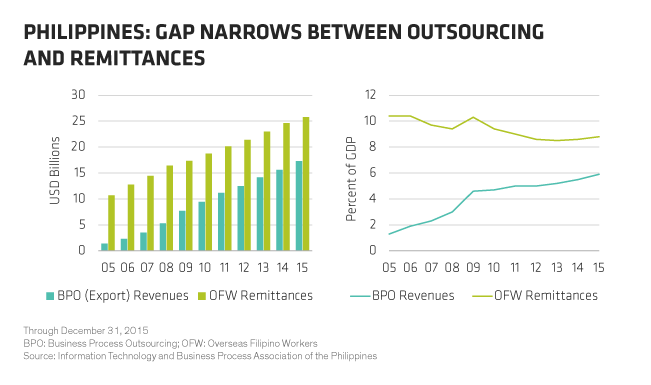The next president of the Philippines, to be elected May 9, is expected to maintain the momentum of the country’s vibrant economy. A key challenge, however, will be to remove potential blocks to the booming outsourcing industry.
Under outgoing president Benigno S. Aquino III, the Philippine economy has posted six years of solid growth. In particular, business process outsourcing (BPO) has become a pillar of consumption growth, accounting for 7% of GDP in 2015. As a contributor to growth, it is now second only to remittances from Filipinos who work abroad (Display).

According to the Information Technology-Business Process Association of the Philippines (IBPAP), information technology, which underpins the BPO sector, is growing at 15%–18% a year, meaning that BPO could overtake remittances as a contributor to the economy in 2017.
Understanding the causes and effects of the BPO boom can help identify important trends for investors.
Young People, Great English
In recent years, a long list of global companies—including Wells Fargo, Verizon, Financial Times and Siemens—have outsourced to the Philippines, drawn to the large English-speaking population and attractive demographics. The average age of BPO workers is 25, and about 60% are women. Today, the BPO industry employs close to 1.2 million workers, according to IBPAP.
Wages in the BPO sector are two to five times higher than for entry-level positions in other industries. The impact on people’s aspirations—and consumption trends—has been profound.
Spending More on Food and Fun
On a recent research trip, we met Julian, a 30-year-old BPO worker with three children in Makati, just south of Manila. Julian began work in tech support for a BPO company nine years ago and earns 200% more than he did in his previous role, as a tutor. This large boost to his income has enabled him to purchase an Xbox, two iPads and an iPhone, and to eat out four times a week with his family, usually at fast-food chains like Jollibee and McDonald’s.
Many people we interviewed described similar changes to their lives, spending more on discretionary items and leisure time at places like Starbucks, perhaps the most popular venue to indulge with friends and get free Wi-Fi as well.
Health Problems Abound
However, earning higher pay at a BPO company can come at a cost. Sarah, a 45-year-old BPO worker we met in Cebu City, in the central region, said her health has deteriorated because of late shifts and an unhealthy diet resulting from her job. Shifts are often timed to fit in with business days on the other side of the world. For Sarah, that’s usually a graveyard shift from 9 pm to 6 am, leading to lack of sleep and time with her family. And despite a recent heart attack, fast food is usually the only option at work.
Many people we interviewed were overweight and expressed concerns about diabetes and heart issues (the National Nutrition Council said last year that three out of five adult Filipinos were obese). Few were proactive about addressing the issues, though some were beginning to pay better attention to their diets. And many BPO workers faced stress and exhaustion from long daily commutes of up to two hours each way, due to traffic and congestion.
Technology and Connectivity
Technology and connectivity are clear winners from these trends. Spending on Internet, mobile services and gadgets is a high priority for BPO employees. E-commerce is benefiting too, with an annual growth rate of 20.7% expected between 2016 and 2020, according to information company Statista.
In a low-growth world, the Philippines stands out as an especially attractive market. But with its stock valuations at a 50% premium to those in other emerging markets, investors need to be very selective in finding companies that can benefit from BPO-driven consumption growth.
Still, there are big structural challenges ahead. Poor infrastructure has a negative effect on productivity, which in turn hurts business performance and returns, and raises questions about the sustainability of BPO sector growth. While there is a broad consensus that no one can derail the Philippines’ impressive growth path, whoever is elected president will be expected to push through improvements to the economy and infrastructure that can help maximize growth potential from the BPO industry.
This blog was originally published on InstitutionalInvestor.com.
The views expressed herein do not constitute research, investment advice or trade recommendations and do not necessarily represent the views of all AB portfolio-management teams.